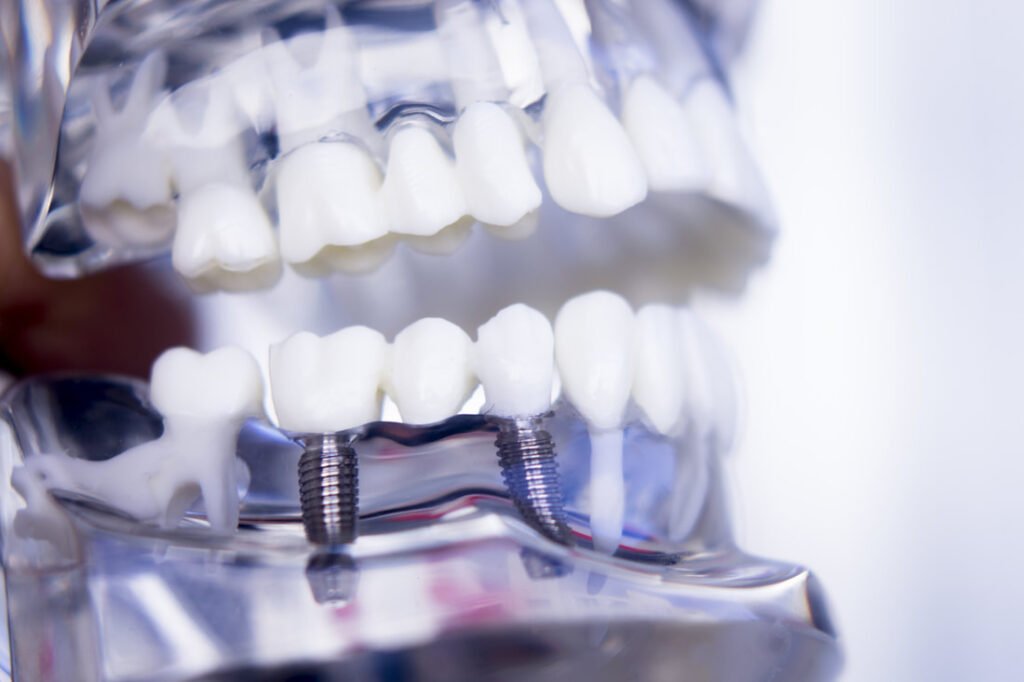Disclaimer: This article is for information only. Always consult a dentist for advice on tooth replacement to ensure the best care for your oral health.
Losing a tooth can happen from an injury, gum problems, or cavities. Replacing missing teeth is important. It helps you eat, talk, and smile. For a long time, people used dentures or bridges. Now, many choose dental implants. They feel like real teeth, last longer, and stay strong. Implants make your mouth healthy and your smile bright.
Understanding Implant Dentistry
How Dental Implants Work to Replace Missing Teeth
Dental implants are tiny metal posts. They go into your jawbone with a small surgery. These posts act like roots for fake teeth. A crown, bridge, or denture sits on top. Over time, your bone grows around the implant. This makes it super strong, like a real tooth. It feels natural and works well for chewing and talking.
Common Myths That Prevent People from Considering Implants
Some think implants hurt a lot. Others think only young people can get them. Some worry they’re risky. But implants are safe for most adults. The surgery isn’t too painful, and success rates are high. If your mouth and bones are healthy, implants can work for you.
When Dental Implants Are the Right Choice
Signs You May Be a Good Candidate for Implants
You might be good for implants if:
- You lost one or more teeth.
- You want teeth that stay in place, not removable ones.
- Your jawbone is strong, or you can get a bone graft.
- You brush and floss well and stay healthy.
Risks of Leaving Missing Teeth Untreated
Missing teeth cause problems. Other teeth can move out of place. Your bite might get messy. Your jawbone can shrink. This changes how your face looks and causes more tooth trouble. Replacing teeth stops these issues and keeps your smile strong.
The Benefits of Implant Dentistry
Restoring Function and Aesthetics
Implants look and feel like real teeth. You can eat, talk, and smile without worry. Unlike dentures, they don’t slip or wiggle. You don’t need sticky glue to hold them. Your smile looks natural, and you feel confident.
How Avoiding Treatment Can Lead to Bone Loss
When a tooth is gone, the jawbone under it shrinks. This happens because the bone isn’t used. Dentures and bridges don’t stop this. Implants do. They act like real tooth roots and keep the bone strong. This helps your face stay young and healthy.
The Implant Procedure and Recovery
What to Expect During the Implant Process
First, your dentist checks your mouth. They take pictures, like X-rays, to see your bones. Then, they plan the surgery. The implant goes into your jawbone. After, it takes a few months for the bone to grow around it. When it’s ready, a connector piece is added. Then, a custom tooth goes on top. The whole process makes your new tooth strong and pretty.
Mistakes Patients Make That Can Delay Healing
Some things slow healing. Smoking is bad for implants. Not brushing or flossing can cause problems. Missing dentist visits can make things worse. Follow your dentist’s advice. Brush, floss, and go to checkups to heal fast and keep implants strong.
Comparing Implants to Dentures and Bridges
Why Implants Outperform Dentures and Bridges in Stability
Dentures sit on your gums. They can move when you eat or talk. Bridges use nearby teeth to stay in place. This can hurt those teeth over time. Implants are different. They go into the bone, so they stay put. They don’t harm other teeth and feel steady.
Downsides of Choosing a Short-Term Tooth Replacement Option
Dentures and bridges cost less at first. But they don’t last as long. You might need new ones every 5 to 10 years. This adds up. Implants last much longer, often for life. They save money in the long run by avoiding extra fixes.
Cost Considerations
Upfront Investment vs. Long-Term Value
Implants cost more at the start. But they last a long time and need little care. Dentures and bridges need replacing or fixing often. This makes implants cheaper over time. They also stop bone loss, so you avoid costly mouth problems later.
Insurance and Financing Options
Not all insurance pays for implants. But many dentists offer payment plans. Some plans cover part of the cost if implants are needed for health. Ask your dentist about ways to pay. This can make implants easier to afford.
Why Patients Prefer Implant Dentistry
A Natural Look and Feel
Implants feel like your own teeth. Many people forget they have them. You can eat anything, like crunchy apples or chewy steak. Talking is easy, and your smile looks real. This makes you feel good about yourself.
Long-Term Oral Health Benefits
Implants keep your jawbone strong. They stop other teeth from moving. This lowers the chance of losing more teeth. Dentures and bridges can’t do this as well. Implants help your whole mouth stay healthy for years.
Conclusion
Choosing between dentures, bridges, and implants takes thought. Dentures and bridges work for some people. But implants are better for many. They feel natural, stay strong, and keep your mouth healthy. Talk to your dentist to see if implants are right for you. With implants, you can eat, smile, and feel great every day.
Disclaimer: This article is for information only. Always consult a dentist for advice on tooth replacement to ensure the best care for your oral health.
